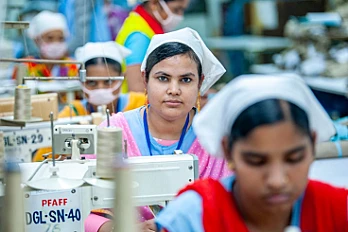Harry Wood | 25 November 2024
Bangladesh garment workers trapped in wage crisis, Swedish report claims

Harry Wood | 25 November 2024

STOCKHOLM - A damning report by Swedwatch exposes the harsh realities faced by garment workers in Bangladesh. Despite years of activism and corporate pledges, the report claims workers continue to earn wages far below what is needed for a basic standard of living.
Bangladesh recently increased its minimum wage for garment workers to 12,500 taka (€94) per month, the first adjustment since 2019. However, this remains a fraction just 38 per cent of the estimated living wage required to cover essentials like food, housing, and healthcare. Workers, already stretched thin, are now grappling with inflation, devalued currency, and declining global demand, the report claims.
Swedwatch's suggests employees depend on excessive overtime to survive. Yet even this lifeline is slipping, as reduced orders from global brands slash available hours.
The report singles out irresponsible purchasing practices by global fashion brands as a key driver of wage suppression. Factories report being forced to accept contracts below production costs due to relentless price pressure and unreasonable timelines imposed by buyers.
“Global buyers don’t adjust prices to cover rising production costs,” said one factory manager interviewed for the study. “We’re left with no margin to pay living wages, let alone make a profit.”
Despite public commitments to fair pay, four out of five brands have not accounted for recent wage increases in their pricing models. Swedwatch warns that these practices perpetuate a cycle of exploitation, where workers bear the brunt of cost-cutting measures.
The crisis extends beyond wages. The report states that most garment workers spend more than half their incomes on overcrowded and unsanitary housing. Healthcare is another major hurdle, with 40 per cent of workers unable to access proper medical treatment due to high costs. Many turn to unqualified providers, further endangering their well-being.
Childcare provisions mandated by Bangladeshi law are often inadequate, with limited capacity and poor quality forcing many women out of the workforce. Female representation in the garment sector has dropped from 56 per cent in 2015 to 53 per cent in 2022, the report notes.
The newly introduced EU Corporate Sustainability Due Diligence Directive (CSDDD) is poised to hold brands accountable for ensuring fair wages and ethical supply chains. However, Swedwatch says success depends on rigorous enforcement and meaningful action by companies.
The report urges global brands to adopt transparent pricing practices, engage with unions, and establish grievance mechanisms to protect workers. It also calls on the EU to set clear benchmarks for living wages and intensify oversight of purchasing practices.